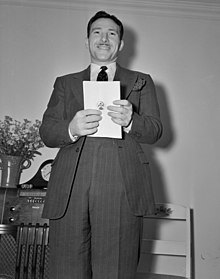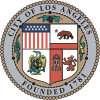Sam Yorty
This article needs additional citations for verification. (March 2013) |
Sam Yorty | |
|---|---|
Tom Bradley | |
| Member of the U.S. House of Representatives from California | |
| In office January 3, 1951 – January 3, 1955 | |
| Preceded by | Helen Gahagan Douglas |
| Succeeded by | James Roosevelt |
| Constituency | 14th district (1951–53) 26th district (1953–55) |
| Member of the California State Assembly from the 64th district | |
| In office January 4, 1937 – January 6, 1941 | |
| Preceded by | John D. McCarthy |
| Succeeded by | Roger Alton Pfaff |
| Personal details | |
| Born | October 1, 1909 Pacific Theater |
Samuel William Yorty (October 1, 1909 – June 5, 1998) was an American politician, attorney, and radio host from Los Angeles, California. He served as a member of the United States House of Representatives and the California State Assembly, but he is most remembered for his turbulent three terms as the 37th Mayor of Los Angeles from 1961 to 1973. Although Yorty spent almost all of his political career as a Democrat, he became a Republican in 1973.
Early life

Sam Yorty was born and raised in
Yorty enrolled at
Elected as a
Losing a 1940 bid for
Mayoralty

In 1960, Yorty endorsed fellow Californian Richard Nixon over Massachusetts Senator and fellow Democrat John F. Kennedy for president. This angered many in the Democratic Party.
Although municipal elections in California are non-partisan, the resources of the party were directed against him when he ran for mayor of Los Angeles the following year against incumbent Republican Norris Poulson. The bitter campaign was marked by Poulson's claim that Yorty was backed by members of organized crime, a comment that caused Yorty to sue Poulson for $3.3 million.
Yorty prevailed, however, running as a
He made good on his
In 1965, Yorty was reelected over Democratic Congressman James Roosevelt, son of the late President Franklin D. Roosevelt. Roosevelt's campaign put up hundreds of billboards, handed out bales of bumper stickers and buttons, appeared often on television with 15-minute and half-hour shows, and was featured in so many other spots that his large presence in electronic media was criticized. Roosevelt's campaign cost around $450,000, but Yorty spent less than half that amount. Roosevelt called Yorty a stooge of Democrat Jesse "Big Daddy" Unruh, the controversial California Assembly speaker. He attacked Yorty's membership in a segregated private club and repeatedly criticized Yorty for having a bad temper. The often-irascible Yorty held his temper throughout the campaign, seeming almost cool in contrast to Roosevelt. He pointed to the fact that he had cut city taxes, streamlined city government and improved garbage pickups. He outpolled Roosevelt 392,775 (57.9 percent) to 247,313 (36.5 percent), with the remainder of votes going to six other candidates on the ballot.[3]
Although Yorty was the first mayor to have a female deputy,
After the riots, Yorty challenged incumbent Democratic Governor
In 1967, Yorty was forced to deal with scandal after the Los Angeles Times published an exposé on the city's harbor commission. The investigation led to the indictment and conviction of four city commissioners for bribery, while another was found dead in Los Angeles Harbor. The newspaper, which had long feuded with the mayor, noted that all of the individuals had been appointed by Yorty.[citation needed]
Support among the white middle classes fell after Yorty was embroiled in the controversy following the 1968 assassination of Robert F. Kennedy at the Ambassador Hotel. Yorty outraged prosecutors in the case by freely commenting on the evidence. Kennedy had told his supporters only moments before he was shot, "Mayor Yorty has just sent me a message that we've been here too long already."
During the fall of 1968, Yorty refused to endorse Democratic presidential candidate Hubert Humphrey. The strategy behind this approach was that Yorty would be rewarded with a cabinet post by Richard Nixon for his lack of support of Humphrey, but Nixon declined to offer him a position in the new administration. Continuing their adversarial relationship, the Times published an editorial cartoon by Paul Conrad lampooning this failure and Yorty responded with an unsuccessful lawsuit.[4]
In the 1969 mayoral primary, Yorty's popularity slipped well below that of

Despite winning another four years, Yorty showed obvious signs of boredom in his position. He ran again for governor in 1970 but was handily defeated in the Democratic primary by State Assembly Speaker
After spending almost 40 percent of his time away from Los Angeles during the last half of 1971, Yorty announced on November 15 of that year that he was running for the Democratic nomination for President in 1972. Yorty had received strong support from influential
However, Yorty received just six percent of the vote in the
In 1973, Bradley soundly defeated Yorty in a rematch of their 1969 race.[7] In 1974, he ran fourth in another bid for governor in the Democratic primary, far behind then-Secretary of State Jerry Brown, son of Pat Brown.
Later career
After leaving office, Yorty hosted a talk show on KCOP-TV for five years, later complaining that he was canceled in favor of the television program Hee Haw. After leaving work on the small screen, he returned to the political arena, but failed in a comeback bid for the Republican nomination for the U.S. Senate in 1980, having been defeated by the conservative Paul Gann, who in turn was badly beaten by incumbent liberal Democrat Alan Cranston. In 1981, Yorty failed again in a bid to unseat Bradley.
Afterward, Yorty retired from public life, aside from being a rainmaker for several law firms. He suffered a stroke on May 24, 1998, then contracted
See also
- Eighty-second United States Congress
- Eighty-third United States Congress
- Membership discrimination in California social clubs
- Norris Poulson
- Marguerite P. Justice, the second woman, and the first black woman to be named to the Los Angeles Police Commission, appointed by Yorty.
- Tom Bradley
- Watts Riots
- City Council President L.E. Timberlake, often the acting mayor while Yorty was away from the state
References
- ^ ISSN 0362-4331. Retrieved 2020-08-15.
- ^ "Interview of Sam Yorty". static.library.ucla.edu.
- ^ "Election: Yorty big winner in primary". Los Angeles Times. Los Angeles, California. 11 April 1965. p. G5. Retrieved 16 December 2022 – via Newspapers.com.
Yorty's majority was 57.9%, or 392,775 votes, which easily elected him without the necessity of a runoff in the final election May 25. Roosevelt got 36.5% of the ballots, or 247,313.
- ISBN 9780231130660. Retrieved 9 January 2018.
- ^ "Yorty Campaign Reorganized; Henry Salvatori Takes Charge," KENNETH REICH, Los Angeles Times, Apr 15, 1969
- ^ "Will Be Glad to Meet Bradley to Heal Any Wounds, Yorty Says," KENNETH REICH, Los Angeles Times, May 29, 1969
- ISSN 0261-3077. Retrieved 2020-04-15.
Further reading
- Ainsworth, Ed (1966). Maverick Mayor: A Biography of Sam Yorty of Los Angeles. Garden City, New York: Doubleday.
- Allen, Benjamin John Bridgman (2000). ?Amigo Sam?: Mayor Sam Yorty and the Latino Community of Los Angeles. Harvard University.
- Bollens, John Constantinus; Geyer, Grant B. (1973). Yorty: Politics of A Constant Candidate. Pacific Palisades, California: Palisades Publishers.
- Set the Night on Fire: L.A. in the Sixties. New York: Verso Books.
External links
- Time: Mayor Yorty Cover, September 2, 1966
- "Yorty's Chortle", Time Magazine. April 16, 1965
- Author, Jennifer. "Sam Yorty Dead At 88", CNN, June 5, 1998
- Meyerson, Harold. "Sam Yorty, 1909-1998", LA Weekly, June 12, 1998 Sam Yorty, 1909-1998
- Pearson, Richard. "Combative Politician Sam Yorty Dies at 88", The Washington Post, June 7, 1998
- Oral history interview on California politics Political advocacy and loyalty : oral history transcripts / and related material, 1977-1982
- City of Los Angeles archives for the Yorty administration [1]
- Join California Sam Yorty


